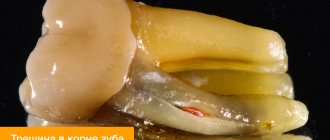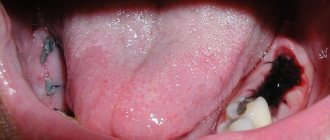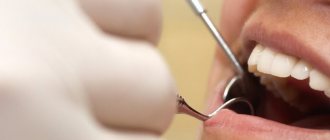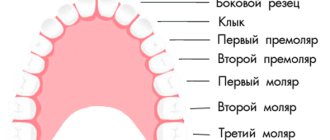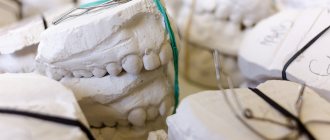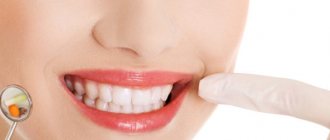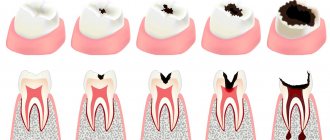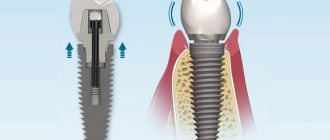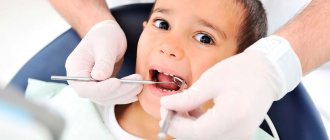.
The tongue is an important organ in the human body, but it is remembered only when it begins to hurt. The tongue can get sick not only from infection, but also from mechanical stress. What does it mean? The tongue rubs against the uneven edges of the teeth.
The most common situation is the chipping of a small section of a tooth. Such a nuisance can happen to anyone. As a result, the uneven edges of the tooth begin to cause discomfort, interfere with normal eating and cause pain during conversation.
Wounds on the sides of the tongue - marks from teeth
If you delay treatment of an injured tongue for a long time, you can get serious inflammation, which can lead to infection of the entire oral cavity.
Causes of chafing
The cause of tongue rubbing can be not only a broken tooth, but also other factors:
Poorly placed filling. Low-qualified specialists in inexpensive clinics sometimes treat their work with negligence. As a result, the placed filling has uneven edges. All excess material slowly begins to cause discomfort in the mucous membrane of the tongue. Sometimes this rubbing reaches the muscle organs.
Uncomfortable dentures. Some people wear dentures, but they can sometimes be uncomfortable. At the initial stage of wearing, a complex orthopedic design can injure the entire oral area. Inconvenience is caused by a poorly polished surface, large prosthetic elements and locking joints.
An uncomfortable denture can hurt your gums and tongue.
Symptoms
If a chip occurs on a front tooth, then the patient’s first complaint is an aesthetic defect.
There may also be:
- pain of varying intensity: from slight soreness to unbearable pulsation;
- sensitivity when eating;
- violation of closure;
- trauma to surrounding tissues (tongue, lips, cheeks) due to sharp chip edges;
- tooth mobility.
The severity of symptoms directly depends on the degree of damage. The stronger the chip, the greater and more pronounced the symptoms. Minor damage does not cause much discomfort, but if a living tooth is severely chipped, the pulp may be exposed, which brings unbearable pain.
What to do
If the tongue is rubbed by a tooth, then it is necessary to assess the degree of chipping. Small chips smooth out quite quickly on their own and no longer cause discomfort. There is no need to treat this tooth, because it does not pose any danger.
All small wounds and abrasions on the tongue will heal very quickly.
To speed up the tongue recovery process, you should refrain from hot, salty and spicy foods. The pharmacy sells special creams and gels that can be used to lubricate damaged areas on the tongue.
Broken tooth requires treatment
Well relieves inflammation using lotions using sea buckthorn or rosehip oil. Apply a moistened cloth to the damaged area for 10–15 minutes. The procedure must be carried out three times a day.
Before going to bed, you can rinse your mouth with propolis tincture. It needs to be diluted more with water. You can simply anoint the rubbed areas with honey.
If a large section of a tooth has chipped, then you cannot do without a dentist. The dentist will sand down all sharp edges and treat them with a special product. It may be necessary to restore the tooth or even resort to prosthetics.
Contacting your dentist will help eliminate the cause of the rubbing.
What to do if it is not possible to go to the dentist in a timely manner, and your tongue begins to rub on your teeth. This situation can happen during a vacation outside the city.
In this case, you can use improvised means. To help smooth out sharp edges:
- file with fine abrasive;
- glass nail file;
- sandpaper with the finest grit.
Clear teeth marks on the tongue
The selected item is first soaked in alcohol or any disinfectant. Light stroking movements smooth out the damaged area. Do not press too hard, otherwise the enamel and gums will be damaged. It is recommended to use this method only in extreme cases.
If a broken tooth has caries and a dark spot appears after a chip, then you should not put off visiting the dentist for too long. Dark staining of the enamel indicates that a destructive process has been activated in the tooth tissues. If the tooth is not treated in time and a filling is not placed, it will have to be removed in the near future.
Injury from sharp edges of fillings
Sometimes, due to serious facial injuries, it happens that a piece of the tooth breaks off below the gum level. In this case, the pain will be very intense. With a deep chip, the gums can be injured. Sometimes a nerve is even exposed. In such a situation, you should immediately consult a doctor. The specialist will take a photo and decide whether the tooth can be healed or whether it will have to be removed. If immediate contact with a doctor is unrealistic, then it is recommended to rinse your mouth as often as possible. For rinsing, it is better to use a decoction of chamomile or sage. If you experience severe pain, you need to take a painkiller.
With such large chips, the gums are usually cauterized or practice is performed. After this, a filling or crown is installed using standard technology.
Content
Tooth decay is an unpleasant event that requires immediate response. This can happen due to injury, untreated caries, brittle teeth and other reasons. Any chips, even small ones, mean a violation of the integrity of the enamel. That is, the tooth becomes vulnerable, infection can enter and the destruction of the crown part can continue. The patient begins to feel discomfort and pain when exposed to hot and cold temperatures, sweet and sour. The sharp edge of the chip injures the soft tissue of the gums during chewing, and bacteria penetrating into the wound cause inflammation. To restore your tooth and avoid negative consequences, you should immediately make an appointment with a specialist.
Broken wisdom tooth
Dentists almost always recommend getting rid of wisdom teeth right away. After all, they can cause a lot of trouble. Due to their atypical location, significant discomfort occurs in the oral cavity. In addition, they may erupt with pain.
Let's try to figure out whether it is worth removing a wisdom tooth if it is cracked. Removal should only be considered if the tooth in question is causing a lot of trouble. If it has a normal shape, does not hurt and has grown correctly, then it is better to treat it. A wisdom tooth is a regular tooth and is treated in the same way. In any situation, you should not rush to remove it, because no tooth is superfluous.
Activities before visiting the dentist
Depending on the extent of the damage, the patient may feel discomfort from increased sensitivity and pain. If a sharp edge is formed after the chipping, it will scratch the gum, tongue, and cheek. Such damage is a favorable environment for infection. The sharp edge must be isolated as soon as possible. A tooth that has lost full enamel protection is also vulnerable to infection.
While waiting for a visit to the dentist, the patient can take a number of actions to minimize negative consequences:
- Do not put any pressure on the affected tooth or chew hard food on its side.
- Thoroughly clean the chipped area, avoiding the accumulation of food debris and plaque.
- Rinse with a soda solution (you can add iodine and salt).
- If your chipped tooth hurts, you can take a pain reliever.
Prevention from chips
The best prevention against chipped teeth is daily oral hygiene and timely visits to the dentist.
You should also be less involved in extreme sports and avoid life situations that can lead to mechanical damage to the jaw and teeth in particular. It is also not recommended to eat too hard foods (nuts, seeds).
Careful hygiene - prevention of tongue wounds
All of the situations described above are very unpleasant, so you need to watch your teeth very carefully. Dental health directly affects the gastrointestinal tract, and therefore the functioning of the entire body. Therefore, it is very important that your teeth are in perfect condition.
Preventive measures
Preventative measures for chipping can be considered: remineralization, sanding, fluoridation.
You should also follow some recommendations:
- Reduce the amount of carbohydrates consumed (sweets, soda, juices, flour products).
- Monitor your vitamin intake (fluoride, calcium).
- Regularly visit a dentist every six months for a preventive examination and carry out professional oral hygiene.
- Maintain good oral hygiene at home.
- Do not use whitening pastes on a regular basis.
- Eliminate the habit of chewing pencils and pens.
Traditional treatment
If a lump is found in a child, it is not recommended to resort to using any folk remedies on your own, as they can negatively affect the baby’s condition.
For adults, rinsing with antibacterial compounds is perfect. They will help prevent the development of inflammation in the injured area of the mucosa, and will also help maintain the cleanliness of the oral cavity. An important addition: you can use traditional methods only if there are no allergic reactions to herbs. Otherwise, it is better to refuse alternative treatment. The most effective recipes are described below:
- Salt rinse. To do this, dissolve a teaspoon of sea salt in a glass of warm water. Rinse your mouth after eating; after treatment, you should stop eating for at least an hour.
- Chamomile decoction. It is most convenient to use ready-made filter bags, which are sold at the pharmacy. You need to fill one such packet with a glass of boiling water, let it brew and use it to treat the oral cavity.
- Calendula. For this rinse you will need an alcohol solution. Twenty drops of tincture are dissolved in a glass of warm water and used after any meal, preferably before going to bed.
- Propolis. This beekeeping product has excellent antiseptic and healing properties . It is used in the amount of one teaspoon per glass of warm water.
The above recipes are not only effective, but also affordable, and if used regularly, they will help to avoid infection of the oral cavity.
This may harm the enamel
It is difficult to deny yourself your favorite delicacy, but often it harms the enamel, and this can lead to complete destruction of the root and tooth loss. The information on the site will help you determine which foods may be harmful and how to eat them correctly. What you should give up:
Many people start their morning with a cup of their favorite coffee. Did you know that this pleasure can cause serious harm to your enamel? You will learn what to do and how to deal with the consequences of coffee addiction from the sections of the site. Delicious cakes and chocolates accompany everyone from childhood, and this is not only tasty, but also harmful. You can find useful information about the dangers of sweets and their effect on tooth enamel on the website. Hard foods and nuts can not only damage the enamel, but also lead to tooth loss. You will learn what to do and how to avoid consequences using our website.
If you are a fan of frequent snacking, then you need to think about the consequences, because frequent eating harms your teeth.
Treatment
Like any serious disease, traumatic stomatitis requires immediate treatment. First of all, the doctor will have to eliminate the source of injury:
- In the case of a broken or chipped tooth, it is necessary to cure or remove this tooth, depending on the depth of the damage.
- Braces and dentures are improved or remade from higher quality material.
- Tartar is removed and the sharp edge of the tooth is ground down.
- If there are minor injuries, wounds and cracks are washed with antiseptics (peroxide, furacillin, infusions of calendula or chamomile).
- More serious injuries are numbed and treated with anti-inflammatory drugs.
- For quick healing of wounds, ulcers and erosions, your doctor may recommend applications with rosehip or sea buckthorn oils, vitamin A oil solution and other keratoplasties.
- In cases of thermal burns or frostbite, applications of an anesthetic drug may be necessary, but in case of a chemical burn, you must first thoroughly rinse the damaged area with a neutralizer. For an acid burn, use an alkali solution, and for an alkaline burn, accordingly, use an acid solution. And only after eliminating the traumatic substance is further treatment with antiseptics and anesthetic rinses possible.
Traumatic stomatitis of the oral cavity - the result of soft tissue injury
Any injury can sooner or later lead to serious delayed consequences. And although getting an injury to the oral cavity is more difficult than hitting a limb, damage to the teeth, gums, cheeks and tongue is not uncommon. The consequence of injury can be various diseases; in this article we will look at one of the options - traumatic stomatitis. From the article you will learn what the causes and symptoms of this disease are, as well as how it can be diagnosed and treated.
When is implantation needed?
Implantation is required if the root part of the tooth is damaged and cannot be used as a support for a prosthesis. This can happen when the side wall of the tooth is broken (below the gum level), deeply damaged by caries, root fracture, etc. In these cases, the tooth is completely removed and replaced with a titanium rod - an implant. Crowns are also placed on implants. These are metal ceramics and zirconium dioxide; ceramic prostheses are not used due to their high fragility.
Biting your tongue - everyone knows this
Biting the tongue, cheek or lip is accompanied by painful sensations, as damage to the mucous membrane occurs.
Obviously, the initial goal after a bite is to reduce pain. So, what should you do if you bite your tongue, what and how to relieve pain and inflammation?
The main rule is to remain calm. Calm down and try to come to terms with the pain, because tantrums and tears will not help heal the damage.
And then you should do the following:
- Be sure to stop bleeding , if any. An elementary solution would be to repeatedly rinse with cold water: it will help narrow the blood vessels and reduce bleeding activity. A worthy alternative would be a piece of ice.
- Cotton swabs soaked in 2% Lidocaine help in the fight against painful sensations . Another variation to reduce pain is eye drops with an anesthetic - Tetracaine, Alcaine.
- It is important to disinfect the entire oral cavity : brush your teeth thoroughly and rinse your mouth.
- Maintain regular rinsing : it is advisable to wash away the remains of eaten food after each meal.
- Use antiseptics such as Antiangin, Trachisan, Furacilin in the form that is optimal for you: spray, lozenge or solution.
- Avoid eating rough, cold or hot foods . During the restoration of the oral mucosa, it is advisable to create a daily menu of liquid soft foods at medium temperature: purees, soups.
- Avoid cold foods - ice cream, frozen juice and other foods with temperatures below zero - they slow down the healing process.
- Take a course of vitamins to help restore damaged areas. The optimal solution would be to include vitamin C and group B in the diet.
Do not forget to adhere to sanitary and hygienic measures: do not reach into the oral cavity with dirty hands, do not put pressure on the resulting injury.
Never pour iodine or brilliant green or peroxide into a wound: give preference to treating the environment around the injury. Antibiotics can only be used as prescribed by a doctor.
Treatment Basics
As mentioned earlier, treatment for tongue injuries depends on the nature of the injury. While a home first aid kit is sufficient to heal superficial injuries, eliminating the consequences of traumatic factors in case of serious injuries requires, first of all, consultation with a doctor who will select the necessary medications and prescribe recommended procedures.
What to do depending on the type of injury:
- The standard method of treatment or initial treatment of mechanical injuries is the use of antiseptics (alcohol, iodine, brilliant green). Rinsing with disinfectants helps in restoring the mucous membrane: furatsilin, hydrogen peroxide, potassium permanganate dissolved in water in a ratio of 1 to 3000 or baking soda at the rate of 1 teaspoon per 250 ml. Do not neglect plant decoctions with calming properties.
- Knowledge of chemical neutralizing reactions will be useful in case of chemical burns, because the “golden rule” of first aid for this is as follows: rinse with a neutralizing solution. Timely implementation of the necessary procedures will avoid further treatment. Blisters appearing on the tongue indicate severe damage. Opening of formations with subsequent processing should only be carried out by specialists. After neutralizing the blisters, doctors most often prescribe rinsing the mouth with disinfectants.
- Profusely bleeding wounds require immediate tamponade. It is unacceptable to independently remove foreign bodies from ulcers.
Having diagnosed the exact cause of pain in the tongue during an in-person consultation with a doctor, you can begin complex treatment.
Burning pain on the tip of the tongue of vegetative-vascular origin requires the administration of B vitamins and sedative correction. To relieve severe pain, local analgesics and novocaine blockade are recommended. Glossalgia, which develops against the background of iron deficiency, often occurs with a decrease in the sensitivity of the tongue receptors. To eliminate iron deficiency anemia, appropriate medications are prescribed.
An injection of nicotinic acid and no-spa will help improve microcirculation inside the capillaries. Transnasal electrophoresis has proven itself well in treating this problem. Positive dynamics are observed with the use of a galvanic collar.
Tranquilizers and sedatives are prescribed to people suffering from nervous disorders and panic attacks. Psychoanalysis plays an important role in the treatment of glossalgia. On its basis, autogenic training and even a hypnotic session are developed for the patient.
An effective method of treating this pathology is acupuncture, which can reduce the impact of neurological disorders that are not amenable to traditional treatment. Speech organ pain complicated by paresthesia is treated with laser therapy.

